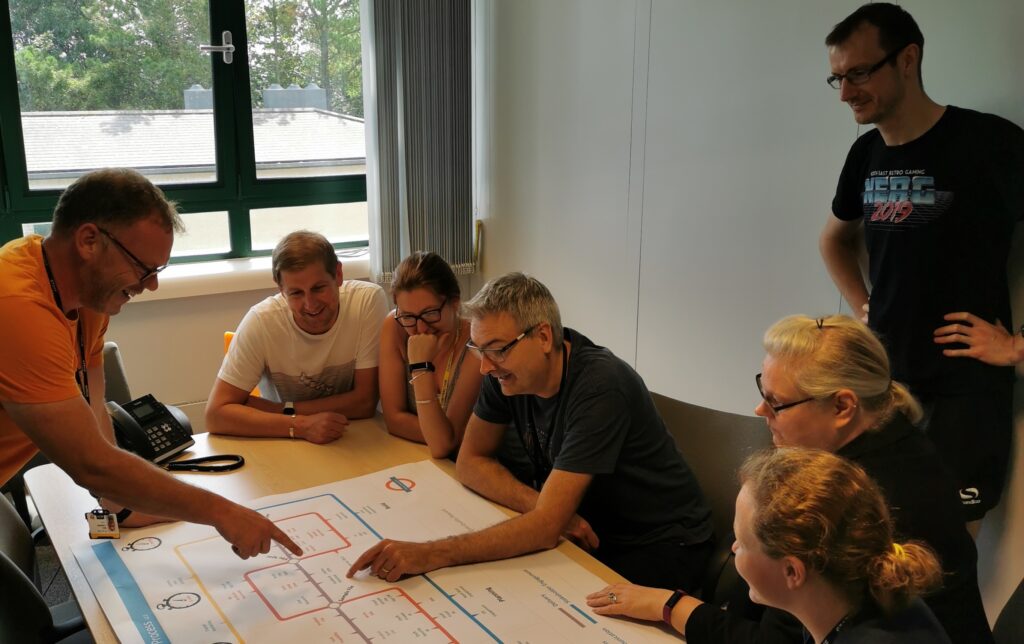
You may not have heard of Local land charges (LLCs) but these are really important. LLCs are restrictions placed on land and property, including things like:
- conditional planning consents
- tree preservation orders
- conservation areas
- listed buildings
It’s a legal requirement for local authorities or other originating authorities to register LLCs and for property buyers to be alerted to their existence during the conveyancing process.
Currently, each local authority’s LLC data is held in a variety of formats, search results all look different, costs vary between authorities and it can take days or weeks to deliver them.
To make it easier to register LLCs and make them easier to find, HM Land Registry created a digital register. Last month we celebrated the one year anniversary of live service of the central, digital LLC Register.
Designing a new digital service – the challenges
Designing a single service for all 316 local authorities was challenging because:
- there were already legacy systems and processes in place
- authorities captured information in different ways
- we had to make some tricky decisions around how to capture charge categories, statutory provisions and spatial data
Digital service design is all about working with users to deliver the service they need. That’s why we carried out research with over 500 users from local authorities and customers, to find out exactly what they needed. This includes providing LLC search results for conveyancers or search providers and maintaining data on the register.
Making sure data is accurate in the central register
Migrating LLC data from the first six local authorities was tough but we’ve improved the process with each migration.
Many local authorities believe they have good quality data. However, this is because the data is usually checked by staff before being issued and small differences between charges in, for example, how dates are recorded, are irrelevant. Once the data is migrated to the centralised register, these differences cause problems so they need to be fixed.
Before loading onto the register, the data goes through some stringent quality checks. For example, we validate that the charge locations match the postcode areas and that charges with the same address have the same locations. These types of measures are there to give end users the confidence in search results which have been issued without any manual checking.
Helping local authorities clean up data before migration
While our face to face research with local authorities was useful, it’s still difficult to predict how long it’ll take to migrate an authority’s LLC data to the digital register.
To solve this problem, we looked into the aspects of the migration process that were causing the delays and worked on developing tools to speed this up.
We introduced the Data Analysis Dashboard to offer support to local authorities before starting their data migration journey. The dashboard highlights the areas which need updating, like standardising charge date formats.
The dashboard gives local authority staff a snapshot of the quality of data in their register and offers a starting point for discussions on where effort is best placed to make improvements. In this way, local authorities can begin to clean their data well in advance of migration, knowing where HM Land Registry can offer automated fixes and where they will need to allocate resources to make manual fixes.
Capturing spatial data
Another problem we’ve had to tackle is capturing missing spatial data. To help in this area we developed a Migration Helper tool which local authorities can use once they start migrating their LLC data. This tool suggests polygons where none exist. Users can select the most appropriate spatial extent for the charge or amend a suggested polygon if it’s almost accurate. This allows users who make manual fixes to complete this task much more quickly.
Both the Data Analysis Dashboard and Migration Helper tool are proving really popular with authorities we’re working with and helping to speed up migration.
Making the digital register user friendly
We designed our digital register to make it easy for anyone to use even if they have no previous knowledge of LLCs. Anyone from a temporary office worker to a citizen wanting more information on a property can get almost instant results.
We went through many design iterations of the user interface (UI). The UI was designed to be simple and intuitive and we guide users through the journey whilst giving flexibility to enter additional Individual data if required.
Our UI tests well across the digital inclusion scale of all user groups and early adopters loved it. We give the user the power to decide what they want to search or amend quickly and easily.
We’re still user testing and adapting the service to make sure it’s accessible to as many people as possible.
To allow all users to access and understand data on the register (including citizens, not just local authority staff) we used plain English throughout and simplified the categories from the 12 ‘parts’ of the local authority registers. We removed some of the less frequently used ‘parts’ and added detail in more common areas.
Simplifying charge creation
The LLC Register accepts Shapefiles to create charges via the user interface and GeoJSON via our API for search and creation of new charges. We coded in the open and you can visit the HM Land Registry GitHub to let us know what you think.
Our LLC service is a small but important cog in the conveyancing process, which has been well received across all user groups. We continue to work closely with migrated authorities and companies who are actively requesting searches in these areas.
How to use our digital register
Anyone can access the digital Local Land Charges (LLC) Register through our Search for local land charges service. Each search result provides details of entries on the LLC Register relating to the land or property concerned. You have the option of performing a personal search for free or downloading an official search for £15, which provides more detail.
Future uses
We’re keen to understand the benefits of having a national dataset of Local Land Charges information with spatial data. If you’re interested in discussing this with us, please email llcproject@landregistry.gov.uk.

1 comment
Comment by John Harvey posted on
The Government is committed to "professionalising" property management.
This must include a commitment to using technology that ensures that information for providing information such as that given in replies to form LPE1 is held consistently as open data so that it can be downloaded as simply as LR copy entries
The Land Registry's experience with local land charges could be essential in achieving this